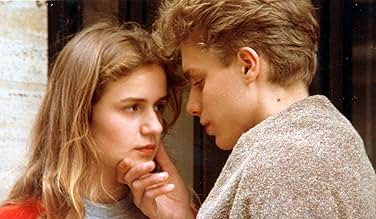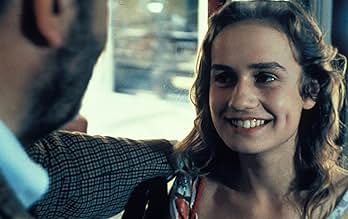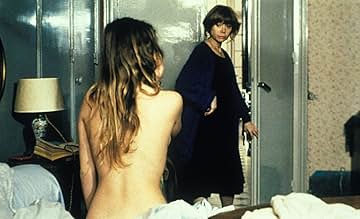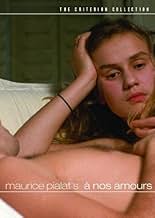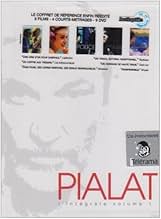CALIFICACIÓN DE IMDb
7.1/10
7.6 k
TU CALIFICACIÓN
La familia de una joven errática intenta desesperadamente evitar sus formas cada vez más eróticas.La familia de una joven errática intenta desesperadamente evitar sus formas cada vez más eróticas.La familia de una joven errática intenta desesperadamente evitar sus formas cada vez más eróticas.
- Dirección
- Guionistas
- Elenco
- Premios
- 4 premios ganados y 3 nominaciones en total
- Dirección
- Guionistas
- Todo el elenco y el equipo
- Producción, taquilla y más en IMDbPro
Opiniones destacadas
This is the story of a teenage French girl (Sandrine Bonnaire) with a difficult home life. Both her father (who abandons the family) and her older brother (who regularly physically assaults her) seem to have an unnatural interest in her sexuality, while her mother (who may the worst of them all) is a raving hysteric who eggs everyone else on. Not surprisingly, the girl is quite promiscuous, availing herself of any number of boys and men. In an American movie like this, her male paramours would at best be panting dogs and at worst villainous cads taking advantage of a vulnerable girl, but here they're probably the most sympathetic people in the movie!
The young girl is not unsympathetic by any means, but she simply refuses to be a victim and remains firmly in control, and no family member or lover ultimately seems to have much chance against her. She is similar to the kind of "feminist lolitas" that often appear in Catherine Breillat movies like "A Real Young Girl" and "36 Fillete"-- teen girls that are very desirable, but also wise beyond their years and in perfect control of their own sexuality, and thus never simply mere sex objects. It's surprising Bonnaire never worked directly with Breillat because she is a much more self-assured and commanding actress than any of the ones Breillat did work with. I don't know if I believe the IMDb dates regarding Bonnaire's age as her assured acting (and her nude body) suggest that she was somewhat older than the character she's playing here, but she's very impressive regardless. Interestingly, while she became a very formidable actress in her later years (especially in films like Claude Chabrol's "Initiation"), she would not really be one of your more glamorous and sexy French actress. She certainly compares well to her contemporaries at the time like Emmanuelle Beart and Sophie Marceau, but while they would become leading ladies, she stayed more of a character actress.
Ironically, the one problem I had with the movie is that Bonnaire and her character is perhaps TOO self-assured and as an actress Bonnaire tends to dominate the rest of the cast too much. It might be a feminist statement to have young female protagonist who is this self-confident, but I don't know that it's necessarily very realistic.
The young girl is not unsympathetic by any means, but she simply refuses to be a victim and remains firmly in control, and no family member or lover ultimately seems to have much chance against her. She is similar to the kind of "feminist lolitas" that often appear in Catherine Breillat movies like "A Real Young Girl" and "36 Fillete"-- teen girls that are very desirable, but also wise beyond their years and in perfect control of their own sexuality, and thus never simply mere sex objects. It's surprising Bonnaire never worked directly with Breillat because she is a much more self-assured and commanding actress than any of the ones Breillat did work with. I don't know if I believe the IMDb dates regarding Bonnaire's age as her assured acting (and her nude body) suggest that she was somewhat older than the character she's playing here, but she's very impressive regardless. Interestingly, while she became a very formidable actress in her later years (especially in films like Claude Chabrol's "Initiation"), she would not really be one of your more glamorous and sexy French actress. She certainly compares well to her contemporaries at the time like Emmanuelle Beart and Sophie Marceau, but while they would become leading ladies, she stayed more of a character actress.
Ironically, the one problem I had with the movie is that Bonnaire and her character is perhaps TOO self-assured and as an actress Bonnaire tends to dominate the rest of the cast too much. It might be a feminist statement to have young female protagonist who is this self-confident, but I don't know that it's necessarily very realistic.
For many, the lack of a defined storyline is maddening, often resulting in a less than satisfying experience. Almost stream-of-consciousness in its approach, Maurice Pialat's À Nos Amours does not appear to have much story structure, but the story is most definitely there and is related with a subtlety not often found in modern film.
Bonnaire's portrayal of Susanne is brilliant (as others have said), and her almost wistful sadness permeates the performance. In one scene, her father (played by Pialat) says, "You never smile anymore," indicating the transformation of Susanne from innocence to experience. The men in her life are shown only for the time she is with them. There is neither introduction upon their arrival nor explanation as to their departure. Pialat uses this method to show Susanne's lack of emotional investment in these temporary romances.
The only men who do return are her father, her brother, and Luc, her one real love. It is when she is with these men that she shows her true self, rather than the detached uncaring girl who sleeps around in an effort to replace them. The dialogue drives this film. There is little music, save the inspired use of Klaus Nomi's "The Cold Song". The sad wailing of Nomi's pseudo-operatic vocal against the opening credits of Susanne in the pulpit of a boat is a wonderful moment.
Long out of print, this film is now available on DVD. It is deserving of a look by the discerning cinephile who may have missed it 25 years ago.
Bonnaire's portrayal of Susanne is brilliant (as others have said), and her almost wistful sadness permeates the performance. In one scene, her father (played by Pialat) says, "You never smile anymore," indicating the transformation of Susanne from innocence to experience. The men in her life are shown only for the time she is with them. There is neither introduction upon their arrival nor explanation as to their departure. Pialat uses this method to show Susanne's lack of emotional investment in these temporary romances.
The only men who do return are her father, her brother, and Luc, her one real love. It is when she is with these men that she shows her true self, rather than the detached uncaring girl who sleeps around in an effort to replace them. The dialogue drives this film. There is little music, save the inspired use of Klaus Nomi's "The Cold Song". The sad wailing of Nomi's pseudo-operatic vocal against the opening credits of Susanne in the pulpit of a boat is a wonderful moment.
Long out of print, this film is now available on DVD. It is deserving of a look by the discerning cinephile who may have missed it 25 years ago.
10bob998
Let me get it off my chest now: I'm very disappointed in the lack of notice given Pialat's films. Why am I only the fifth person to review À nos amours, and not the 500th? This is the sixth feature by Pialat, and it is a masterpiece. The travails of Suzanne and her family have universal implications; if you think only of her relations with her brother Robert--violent at times, yet often tender and half-incestuous--that's enough material for a film in itself. Some people are bothered by the promiscuous nature of Suzanne's love life, how she just doesn't behave like a regular teenage girl should. I have met a girl like her.
About two-thirds of the way through, we are confronted with a scene of astonishing virtuosity: the party at the family home, into which erupts the absent father, played by Pialat himself. The script the actors had been given gave no notice of this plot turn; it is fascinating to watch eight actors dealing with this incredible event--no one blows the scene, no matter how dumbfounded they must have been. For about ten minutes, we get pure acting, or reacting, however you want to put it. This is the kind of film event that makes movies worthwhile.
Bonnaire is tremendous, it's one of the greatest debuts in film history. Pialat as the father is great, all the more remarkable in that he had never acted before. The dimple scene is wonderful. Dominique Besnehard has to bring off an unsympathetic role as the brother, and he performs very well.
About two-thirds of the way through, we are confronted with a scene of astonishing virtuosity: the party at the family home, into which erupts the absent father, played by Pialat himself. The script the actors had been given gave no notice of this plot turn; it is fascinating to watch eight actors dealing with this incredible event--no one blows the scene, no matter how dumbfounded they must have been. For about ten minutes, we get pure acting, or reacting, however you want to put it. This is the kind of film event that makes movies worthwhile.
Bonnaire is tremendous, it's one of the greatest debuts in film history. Pialat as the father is great, all the more remarkable in that he had never acted before. The dimple scene is wonderful. Dominique Besnehard has to bring off an unsympathetic role as the brother, and he performs very well.
France dubbed this the best film of 1983, and named the love Sandrine Bonnaire, in her first credited role, as it's most promising actress for that year. It is easy to see why as she was a joy to watch as she flitted from bed to bed trying to find happiness. I am sure there are many who will shirk at the thought of admiring the 15-year-old's body.
Those not in the loop on French films will not appreciate the style and grace of her life as she deals with a family that fights all the time, and can only find an outlet for emotions in the arms of willing lovers. But, she avoids the one who loves her Luc (Cyr Boitard), treating him like dirt when he says he loves her.
Excellent film with great performances by Maurice Pialat as the father and Evelyne Ker as the mother, as well as a knockout job by Bonnaire.
Those not in the loop on French films will not appreciate the style and grace of her life as she deals with a family that fights all the time, and can only find an outlet for emotions in the arms of willing lovers. But, she avoids the one who loves her Luc (Cyr Boitard), treating him like dirt when he says he loves her.
Excellent film with great performances by Maurice Pialat as the father and Evelyne Ker as the mother, as well as a knockout job by Bonnaire.
Others have already said that "À nos amours" is a great film, even more have said that Sandrine Bonnaire was a knockout in her demanding rôle as Suzanne. There is a sort of timeline, a beginning and an end, but this is really a film about a personal journey through a part of Suzanne's late adolescence. Young people who have watched the film recently are sometimes very annoyed with Suzanne, but this only proves that Miss Bonnaire has made them care about her character even to the point that they perhaps want to shake her, to take her into a corner and tell her what mistakes she is making. There is also a conflict which some pretend had disappeared by the end of the "swinging sixties" - the generation gap between the sexual mores of parents and adolescents, which was of course still real in the early eighties and remains so in many cultures. Unpredictable behaviour (by Suzanne's brother, for example) is also a real part of family life for many young people. Every time I watch the film (and I have seen it very often, as I used it in my French classes more than once) I notice details which had escaped me or which I had forgotten. Pialat made other great films, but "À nos amours" remains my favourite. If possible watch it in French, with subtitles if necessary - but see it before you die!
¿Sabías que…?
- TriviaIn the original script, the father was due to die and was not scheduled to return at the time of the dinner scene. Maurice Pialat walked into the scene and left the actors to improvise in a situation they hadn't planned for.
- ErroresIn the sequence with the American, Suzanne's outfit changes from a one-shoulder black dress with white stripes trimming just the top of the bodice, to a one-shoulder black&white striped top with a black skirt, and back again.
- ConexionesFeatured in Sebastian (2024)
Selecciones populares
Inicia sesión para calificar y agrega a la lista de videos para obtener recomendaciones personalizadas
- How long is To Our Loves?Con tecnología de Alexa
Detalles
- Fecha de lanzamiento
- País de origen
- Sitios oficiales
- Idiomas
- También se conoce como
- To Our Loves
- Locaciones de filmación
- Cité Bergère, Paris 9, París, Francia(Suzanne and Jean-Pierre looking for a hotel)
- Productoras
- Ver más créditos de la compañía en IMDbPro
Taquilla
- Total a nivel mundial
- USD 2,575
Contribuir a esta página
Sugiere una edición o agrega el contenido que falta

Principales brechas de datos
What is the Hindi language plot outline for À nos amours (1983)?
Responda

